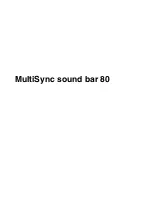
2
RISK OF ELECTRIC SHOCK
DO NOT OPEN
CAUTION: TO REDUCE THE RISK OF ELECTRIC SHOCK
DO NOT REMOVE COVER (OR BACK) NO
USER-SERVICEABLE PARTS INSIDE REFER SERVICING
TO QUALIFIED PERSONNEL
CAUTIONS FOR INSTALLATION
When installing the speaker on a wall or ceiling, it
should be secured firmly using rigid anchor bolts to
prevent it from coming off. Also, care should be taken
with regard to the resonance of the mounting
brackets caused by speaker operations.
If the speaker is operated at high output levels, the
floor, wall or ceiling may vibrate, which will impair the
sound quality. Special care should be taken to
prevent resonance and vibrations caused by the
mounting angles.
Always be sure that the surface chosen for
mounting is structurally capable of supporting the
weight of the speaker. Do not mount more than one
speaker into one Ceiling Mounting Bracket (optional).
Also, avoid having sound absorbing material such as
curtains, etc. on the wall or placing the speakers too
close to the window.
INSTALLATION EXAMPLE
1. KTV/Large Hall Installation
When using several speakers at the same
time, special care must be taken to ensure that the
output level of the speakers would match each other
in order to avoid feedback which may burn the
tweeter with high frequency.
2. Mounting the Speaker to the Ceiling
Place the ceiling mount bracket (Model: SPS-706) on
the top of the speaker cabinet and put two screws to
fasten it. Then, put one screw to hold the speaker
firmly to the ceiling. Adjust the speaker up/ down and
left/right for rotation at different angles to achieve the
maximum sound effect. Please refer to the above
diagram for instruction.
The structure of the ceiling must be strong
enough to hold at least 50 pounds. The ceiling mount
bracket in the diagram is Model: SPS-706 and it is
optional.
3. Mounting the Speaker to the Wall
Place the wall mount panel on the top of the speaker
cabinet and put two screws to fasten it. Then, put
four screws to hold the speaker firmly into the wall.
Adjust the speaker up/ down and left/right for rotation
at different angles to achieve the maximum sound
effect. Please refer to the above diagram for
instruction.
Angle
Location of Microphone
Angle Adjustment
NOTE
NOTE
NOTE






















